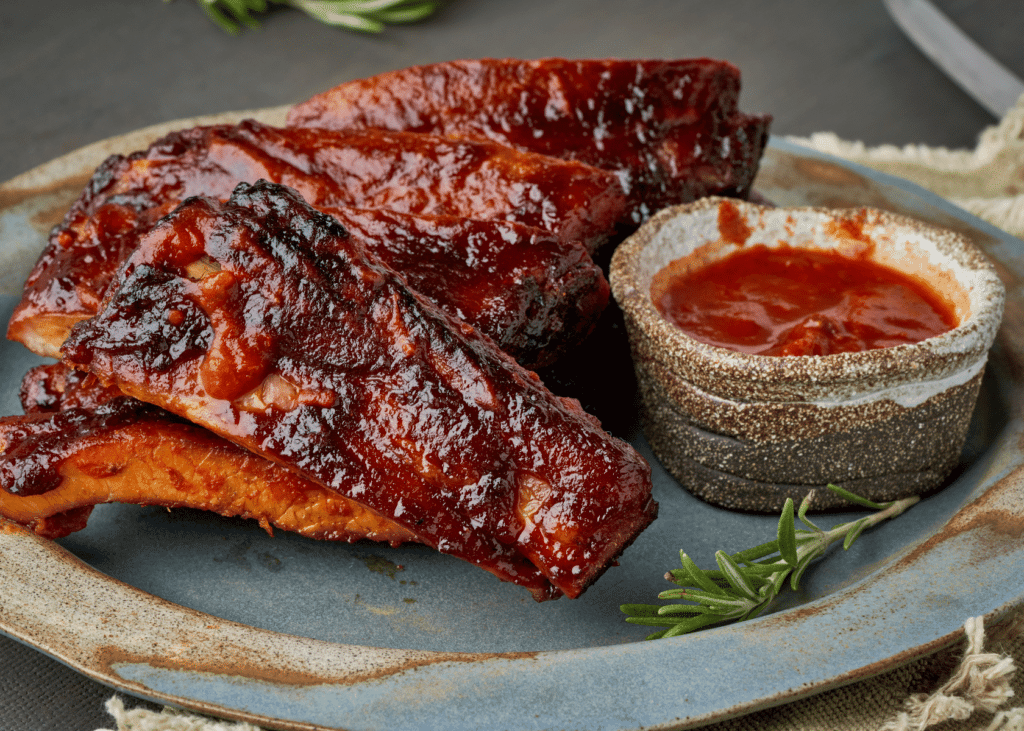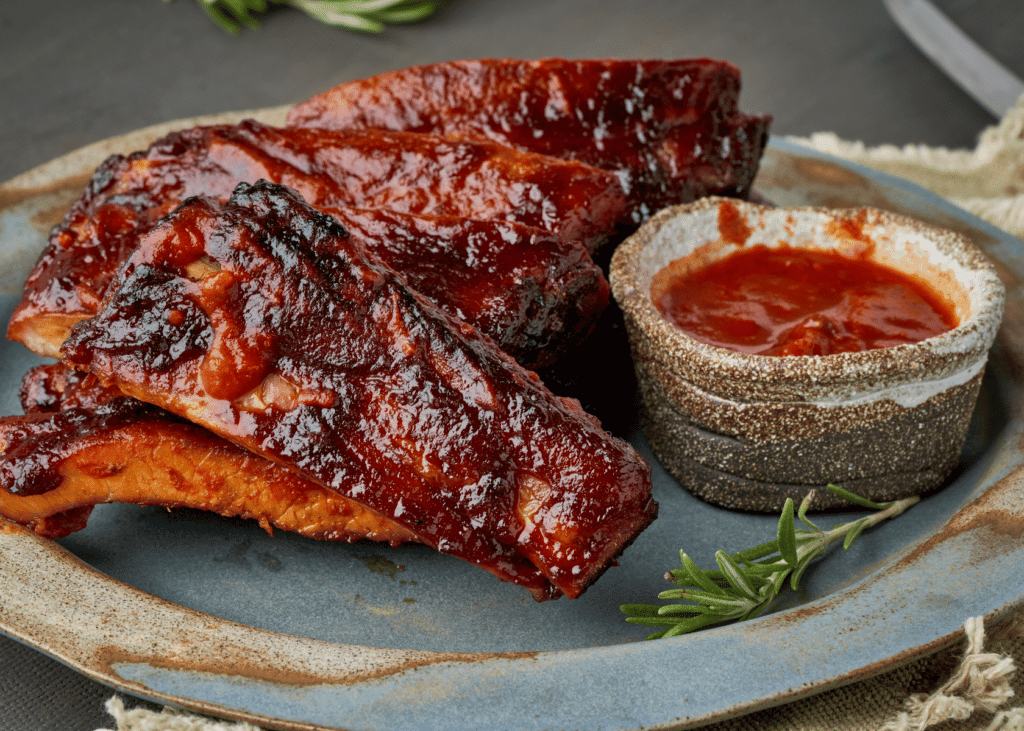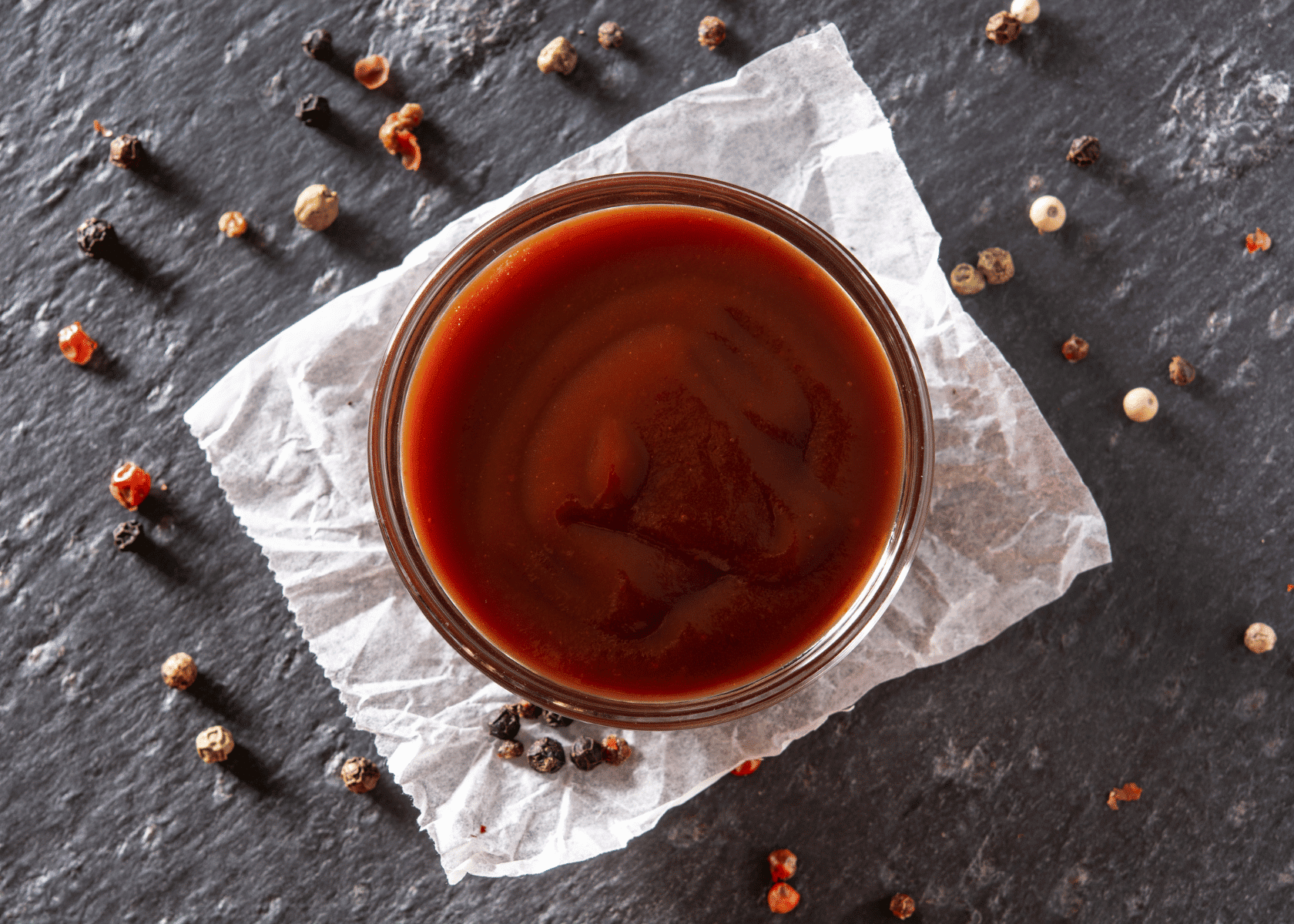Are you a barbecue sauce enthusiast with a sensitive stomach, wondering if your beloved condiment is the culprit behind that uncomfortable acidity welling up in your chest? You may be onto something; most barbecue sauces have an acidic pH level between 3.5 and 4.7 due to ingredients like vinegar or citrus juices.
This article will help you understand why barbecue sauce can be acidic, its effects on acid reflux, how to make it less acidic and other suitable alternatives for those who struggle with acid sensitivity.
Stay tuned; intriguing insights about this popular delicacy await!
Key Takeaways
- BBQ sauce is acidic, with a pH level typically ranging between 3.5 and 4.7, due to ingredients like vinegar and citrus juice.
- The acidity in BBQ sauce can exacerbate acid reflux symptoms for those who are prone to it.
- To manage acid reflux while consuming BBQ sauce, consider limiting portion sizes, avoiding eating on an empty stomach, opting for milder or homemade sauces, adding sweetness to counterbalance acidity, and pairing with alkaline foods.
- For individuals with acid sensitivity, there are alternative options available, such as tomato-free BBQ sauce recipes or low-acid alternatives like Memphis-style or Carolina-style sauces.
Is BBQ Sauce Acidic?
BBQ Sauce is acidic due to ingredients like vinegar or citrus juice, with a pH level between 3.5 and 4.7.
Explanation of acidity levels in BBQ sauce
BBQ sauce is inherently acidic, with a pH level typically ranging between 3.5 and 4.7. This value puts it squarely in the acidic zone of the pH scale to provide perspective; battery acid has a pH level of just 1.0! The root cause of this acidity lies in some key ingredients found across most barbeque sauce recipes – vinegar and citrus juice.
These elements not only amplify taste but also considerably contribute to the overall acidity level in BBQ sauces. Additionally, as processed foods, barbecue sauces fall under the category of edibles that break down into an ash residue after consumption having an acetic effect on our bodies.
Considering these factors can help us understand why BBQ sauce ranks high on acidity levels compared to many other condiments or foodstuffs.
Ingredients that contribute to acidity
Barbecue sauce gets its acidic taste from various ingredients. Here are the key culprits that contribute to the acidity of BBQ sauce:
- Vinegar: Many barbecue sauce recipes include vinegar, which adds tanginess and acidity to the sauce. Vinegar’s pH level ranges between 2.0 and 3.4, making it highly acidic.
- Citrus juice: Another common ingredient in barbecue sauce is citrus juice, such as lemon or lime juice. Citrus fruits have a low pH level, ranging from 2.0 to 2.6, adding acidity to the sauce.
- Tomatobased products: Barbecue sauces often contain tomato-based ingredients like ketchup or tomato paste. Tomatoes have a naturally acidic taste due to their citric acid content.
- Processed foods: Some commercially available BBQ sauces may contain additional additives and preservatives, which can increase acidity levels.
- Ash residue: When meats are cooked over an open flame or charcoal grill, a chemical reaction occurs where the food breaks down into ash residue. This residue can have an acidic effect on the body when consumed in excess.
pH levels of BBQ sauce
Barbecue sauce, a staple in many grilling recipes, has a pH level between 3.5 and 4.7, classifying it as acidic. To put this into perspective, battery acid has a pH level of 1.0, highlighting the acidity of barbecue sauce.
The tart and tangy taste that is characteristic of BBQ sauce comes from ingredients like vinegar or citrus juice, which contribute to its lower pH levels. It’s important to keep in mind that consuming excessive amounts of BBQ sauce with its acidic nature can potentially lead to issues such as acid reflux.
Therefore, understanding the pH levels of sauces can help individuals make informed decisions about their consumption choices and overall health impact.
Effects of BBQ Sauce on Acid Reflux
BBQ sauce, with its acidic nature, can exacerbate acid reflux symptoms.
Impact of acidity on acid reflux
The level of acidity in BBQ sauce can have a direct impact on acid reflux. Acid reflux occurs when the acidic contents of the stomach flow back up into the esophagus, causing discomfort and heartburn.
Since BBQ sauce is already acidic, consuming it in large quantities or frequently can worsen acid reflux symptoms for those who are prone to it. The acidic ingredients like vinegar or citrus juice present in BBQ sauce can irritate the lining of the esophagus, leading to a burning sensation and discomfort.
It is important for individuals with acid reflux to be mindful of their BBQ sauce intake and consider alternative options that are lower in acidity or make adjustments to reduce its overall acidity.
Tips for managing acid reflux while consuming BBQ sauce

- Limit your portion sizes: Eating smaller portions of BBQ sauce can help minimize the risk of acid reflux.
- Avoid eating BBQ sauce on an empty stomach: Ensure you have a meal or snack before consuming BBQ sauce to help reduce the impact of acidity on your digestive system.
- Opt for milder barbecue sauces: Choose BBQ sauces with lower acidity levels, such as Memphis-style or Carolina-style sauces, which are typically less acidic compared to tomato-based varieties.
- Consider homemade alternatives: Make your own BBQ sauce using low-acid ingredients to have better control over the acidity levels. Look for tomato-free recipes or use alternatives like ketchup that are Gerd-friendly and nightshade-free.
- Add sweetness to counterbalance acidity: If you enjoy tangy flavors but want to reduce the acidity, consider adding sweeteners like honey, maple syrup, or brown sugar to balance out the flavors.
- Pair BBQ sauce with alkaline foods: Combine your BBQ sauce with alkaline foods like grilled vegetables, lean proteins, or whole grains to help neutralize the acidity and promote better digestion.
Alternative Options for Those with Acid Sensitivity
For individuals with acid sensitivity, there are alternative options available when it comes to enjoying BBQ sauce.
Tomato-free BBQ sauce recipes
Are you looking for a delicious BBQ sauce recipe without tomatoes? Look no further! Here are some mouthwatering tomato-free BBQ sauce recipes to satisfy your cravings:
Tangy Mustard BBQ Sauce:
- Mix 1 cup of mustard, ½ cup of apple cider vinegar, ¼ cup of honey, 2 tablespoons of Worcestershire sauce, and a pinch of salt in a bowl.
- Whisk until well combined and use it as a marinade or basting sauce for your grilled meats.
Kansas City Style Molasses BBQ Sauce:
- In a saucepan, combine 1 cup of ketchup, ½ cup of molasses, ¼ cup of apple cider vinegar, 2 tablespoons of brown sugar, 1 tablespoon of Worcestershire sauce, and a dash of hot sauce.
- Simmer over low heat for about 10 minutes until the flavors meld together. Let it cool before using.
Carolina Mustard-Based BBQ Sauce:
- In a small bowl, whisk together ½ cup of yellow mustard, ¼ cup of apple cider vinegar, 2 tablespoons of honey, 1 tablespoon of Worcestershire sauce, and a teaspoon each of garlic powder and onion powder.
- This tangy mustard – based BBQ sauce is perfect for pulled pork or chicken.
Alabama White BBQ Sauce:
- Combine ¾ cup mayonnaise, ¼ cup apple cider vinegar, 2 tablespoons each of lemon juice and horseradish.
- Add in a teaspoon each of salt and black pepper along with a pinch of cayenne pepper if desired.
- Stir until well blended and refrigerate for at least an hour before using.
Asian-inspired Ginger Sesame BBQ Sauce:
- In a blender or food processor, combine ½ cup soy sauce (or tamari for gluten – free), ¼ cup rice vinegar,
- Blend until smooth and use it as a marinade or dipping sauce for grilled chicken, shrimp, or tofu.
Low-acid BBQ sauce alternatives
Looking for low-acid BBQ sauce alternatives? Here are some options to consider:
- Memphis-style barbecue sauce: This tangy sauce is known for its vinegar base, which provides a milder acidity compared to other styles.
- Tomato-free BBQ sauce recipes: For those with sensitivities to tomatoes, try making your own BBQ sauce using alternative ingredients like apple cider vinegar, molasses, and spices.
- Gerd-friendly options: If you suffer from acid reflux, opt for BBQ sauces that are specifically labeled as “Gerd-friendly” or “acid reflux-friendly”. These sauces typically have reduced acidic ingredients.
- Carolina barbecue sauce: The traditional Carolina sauce uses mustard as a base instead of tomato or vinegar. It offers a unique flavor profile while being less acidic.
How to Make BBQ Sauce Less Acidic

To make BBQ sauce less acidic, you can adjust the ingredient ratios by reducing the amount of vinegar or citrus juice used and increasing other ingredients to balance out the acidity. Adding sweetness, such as honey or brown sugar, can also help counterbalance the acidic taste.
Adjusting ingredient ratios to reduce acidity
One way to make BBQ sauce less acidic is by adjusting the ingredient ratios. By controlling the amounts of acidic ingredients, you can create a milder and less tart sauce. Here are some tips for reducing acidity in your homemade BBQ sauce:
- Use less vinegar: Vinegar is a common acidic component in BBQ sauces. Try reducing the amount of vinegar in your recipe or using a milder vinegar variety like rice vinegar or apple cider vinegar.
- Balance with sweetness: Adding sweetness can help counterbalance the acidity in BBQ sauce. Consider increasing the amount of brown sugar, honey, or molasses to add a touch of sweetness and balance out the flavors.
- Decrease citrus juice: If your BBQ sauce recipe includes citrus juice like lemon or lime juice, try using less of it to reduce the overall acidity level.
- Opt for low-acid ingredients: Choose ingredients that have lower acidity levels to contribute to your BBQ sauce. For example, using onions instead of tomatoes as a base can help reduce acidity.
- Adjust seasoning proportions: Some spices and seasonings can enhance the perception of acidity in food. Experiment with different ratios and combinations to find the right balance for your taste preferences.
Adding sweetness to counterbalance acidity
Adding sweetness to counterbalance acidity can help balance the flavors of BBQ sauce. Here are some ways you can achieve this:
- Use honey: Adding honey to your BBQ sauce can enhance its sweetness and help counteract the acidity. Start by adding a teaspoon at a time and taste test until you achieve the desired balance.
- Brown sugar: Brown sugar is another great option for adding sweetness to your BBQ sauce. It has a rich flavor that pairs well with tangy ingredients. Begin by incorporating a tablespoon or two, then adjust according to taste.
- Molasses: For a deeper, more complex sweetness, try adding molasses to your BBQ sauce. Its thick texture and distinct flavor can help temper the acidity while adding depth of flavor.
- Fruit juice: Adding fruit juice, such as pineapple or apple juice, can contribute both sweetness and natural acidity reduction to your BBQ sauce. These juices not only provide natural sugars but also add fruity undertones that complement the smoky flavors of barbecued meats.
- Maple syrup: Maple syrup is another excellent sweetener option for balancing acidity in BBQ sauce. Its rich, buttery notes can help mellow out tanginess while imparting a hint of warmth.
Frequently Asked Questions
1. Is barbeque sauce acidic?
Yes, barbeque sauce can be acidic depending on the ingredients used in its preparation. Some common ingredients that contribute to acidity include vinegar, citrus juices, and certain types of tomatoes.
2. Can the acidity of barbeque sauce affect my digestion?
For individuals with sensitive stomachs or acid reflux, consuming highly acidic foods like barbeque sauce may worsen symptoms or cause discomfort. It is advisable to monitor your personal tolerance and make adjustments accordingly.
3. Are there any non-acidic alternatives available for barbeque sauces?
Yes, there are non-acidic alternatives available for those who prefer a milder taste or have dietary restrictions. These options typically involve using different flavor profiles such as honey-based sauces or mustard-based sauces instead of traditional tomato-based ones.
4. How can I determine if a specific brand of barbeque sauce is acidic?
You can check the ingredient list on the label to identify potentially acidic components such as vinegar or citrus juices. Additionally, reading online reviews or reaching out to the manufacturer directly might provide information on the level of acidity in their particular product.
Conclusion
In conclusion, barbeque sauce can indeed be acidic, with a pH level ranging from 3.5 to 4.7. This acidity is primarily derived from ingredients like vinegar and citrus juice. While it adds flavor to our favorite grilled foods, excessive consumption of BBQ sauce with its acidic properties may contribute to conditions such as acid reflux.
However, there are alternatives and adjustments that can be made to reduce the acidity levels in BBQ sauces for those who are more sensitive or looking for a milder option.

